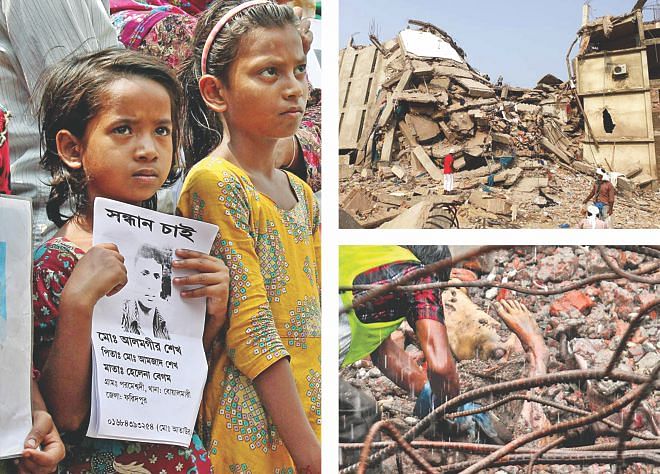Honouring the victims by transforming the RMG sector

ON this day one year ago, horror struck the nation and world. On this day one year ago, Rana Plaza collapsed … and with it thousands of beautiful lives and families were destroyed; the Bangladesh garment industry's reputation was deeply tarnished; the world saw what happens when companies make profits at the risk of workers' lives and safety.
My mom says the darkest tragedies of life have silver linings. I believe such is the case of the Rana Plaza tragedy. Out of this wreckage has emerged a powerful resolve for change. Indeed, Bangladesh has undertaken vital steps to transform the ready-made garment sector and bring it to international standards of fire safety, factory structural soundness, and workers' rights to freely associate and organise. These first steps are important, but the road ahead to achieving these standards is long.
Today we solemnly reflect on that dark day one year ago, when 1135 people perished, hundreds more were devastatingly injured, and so many families were torn apart. Today we honour these victims by again committing ourselves to ensuring that such needless tragedy never happens again.
Rana Plaza was a clarion call for deep, fundamental change in Bangladesh's apparel sector. In response to that call for change, so many things have happened over the past year to launch this transformation and put Bangladesh on track to achieve a strong, dynamic, profitable garment industry, one where workers are fairly compensated, fairly treated, and have a voice in their working conditions to ensure their safety and security.
All of us -- factory owners, workers, brands, government, consumers, civil society, international organisations, and international friends of Bangladesh -- are stakeholders in Bangladesh's future. All of us can help the RMG industry transform itself. The international community, including America, has engaged at an unprecedented level to help Bangladesh's garment industry effect change. Following suspension of Bangladesh's GSP privileges, America provided Bangladesh a road map for reinstating these privileges that included transforming the RMG sector. Bangladesh and its two biggest apparel markets, America and the European Union, adopted last July the Sustainability Compact, which identifies critical steps for addressing the issues of worker rights, fire safety and factory structural soundness. The Compact closely follows the road map for restoring GSP privileges in America. America and Bangladesh's many other friends, including Canada, Germany, the Netherlands, Norway, the UK and others, offer significant resources and technical assistance to help Bangladesh seize this opportunity to truly transform the apparel sector.
For the first time ever, many Western brands and buyers have come together in private sector initiatives, the Alliance and the Accord, to undertake comprehensive safety inspections in their source factories to identify safety concerns. Buyers have also committed to make available funding or loans to help manufacturers implement remedial actions to bring their factories up to international safety standards.
The International Labor Organization has undertaken to assist with inspections of those factories that are not inspected by the Alliance and Accord. The results of all of these inspections are to be made available on the newly-launched, publicly-accessible database. The ILO is providing critical technical advice and coordination to bring about harmonised, systematic changes that involve all stakeholders. The ILO has also launched the largest Better Work programme in history to assist hundreds of factories in achieving safety and labour rights standards.
Some factory owners are showing the way in engaging constructively to bring their factories up to standards; other owners, unfortunately, seem determined to shirk these responsibilities.
Workers are creating independent labour unions to ensure that they, the workers, have a voice as the sector grows and flourishes. Workers must be able to exercise their fundamental rights to freely associate, form unions, and bargain collectively. True worker empowerment and legitimate worker representation are essential to ensuring that workers have a voice strong enough to reject unsafe working conditions. Had the workers of Rana Plaza had such a voice, they likely would be alive today.
Most importantly, the Government of Bangladesh is providing powerful, effective leadership that has already yielded some change in the apparel sector.
Today we honour the victims of the Rana Plaza tragedy by recommitting ourselves to help ensure that there is never again another Rana Plaza. We endeavour that a transformed readymade garment sector will arise from the rubble of Rana Plaza. We support transformation of the sector so its factories meet international standards for fire safety and factory structural soundness and its workers are able to freely associate and organise. This is the only path to ensure that Brand Bangladesh is a premium brand, a preferred brand, in the global marketplace. This is the only path for Bangladesh to achieve its dream of becoming the world's number one exporter of readymade garments.
The writer is US Ambassador to Bangladesh.

 For all latest news, follow The Daily Star's Google News channel.
For all latest news, follow The Daily Star's Google News channel. 




Comments